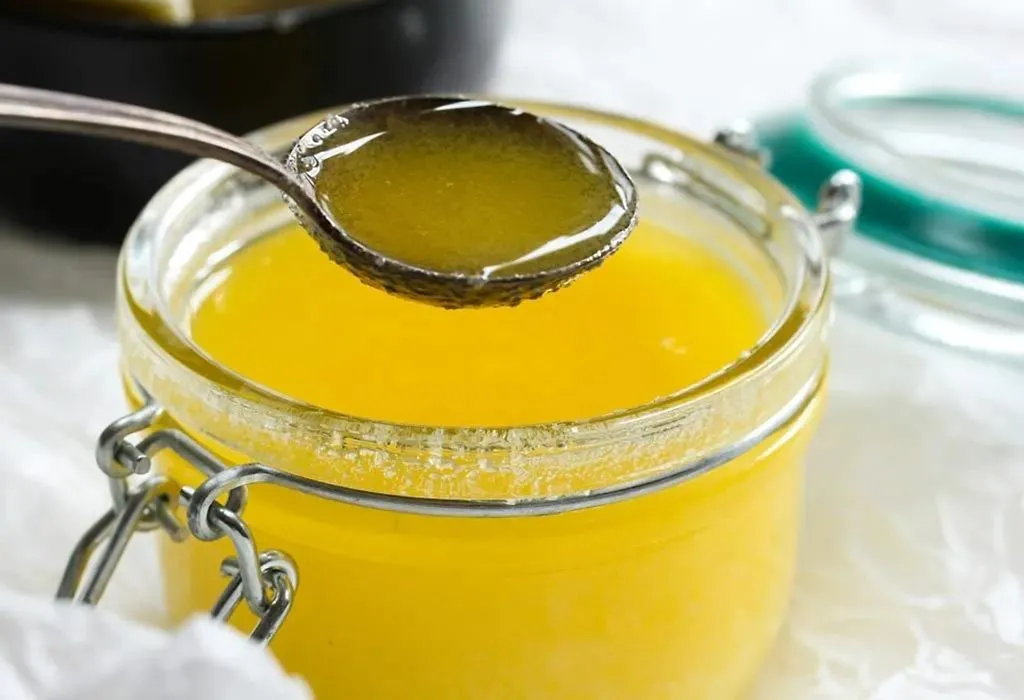In the realm of prenatal nutrition, expectant mothers often seek out foods that not only nourish their own bodies but also promote the healthy development of their babies. Ghee, a traditional clarified butter, has gained popularity for its rich flavor and potential health benefits. However, for mothers navigating allergies, concerns may arise about the safety of incorporating ghee into their diets. Let’s explore this topic in detail to understand whether ghee is indeed safe for moms and babies, particularly in the context of allergies.
Understanding Ghee: A Time-Honored Tradition
Ghee has been a staple in Indian cuisine and Ayurvedic medicine for centuries, revered for its nutritional properties and therapeutic benefits. It is made by simmering butter to remove the milk solids and water content, leaving behind a rich, golden liquid. This process not only intensifies the flavor but also enhances the shelf life of the product.
The Nutritional Profile of Ghee
Before delving into the allergy aspect, let’s first examine the nutritional composition of ghee. PreganCare® Organic Ghee, based in Hisar, Haryana, prides itself on offering a premium product crafted with utmost care and authenticity. Here’s a breakdown of the key nutrients found in PreganCare® Organic Ghee:
| Nutrient | Amount per Serving |
|---|---|
| Vitamin A | 300 IU |
| Vitamin E | 0.4 mg |
| Vitamin K2 | 1 mcg |
| Conjugated Linoleic Acid (CLA) | 4.7 mg per gram |
| Omega-3 Fatty Acids | Trace amounts |
| Omega-6 Fatty Acids | Trace amounts |
Is Ghee Safe for Allergies?
Now, let’s address the primary concern: allergies. Ghee is essentially pure butterfat, with the milk solids and proteins removed during the clarification process. This means that ghee is generally safe for individuals with lactose intolerance or dairy allergies. However, it’s essential to exercise caution if there is a specific allergy to milk proteins, as traces may still remain in some commercial ghee products.
The Role of Casein and Whey Proteins
Casein and whey proteins are the two main components of dairy protein. These proteins are responsible for triggering allergic reactions in some individuals. During the production of ghee, the milk solids containing these proteins are separated and discarded, significantly reducing the risk of allergic reactions.
Benefits of Ghee for Moms and Babies
Despite the potential concerns surrounding allergies, ghee offers a host of benefits for both expectant mothers and their babies:
- Nutritional Support: Ghee is rich in fat-soluble vitamins like A, E, and K2, which are essential for fetal development and maternal health.
- Digestive Health: Ghee contains butyric acid, a short-chain fatty acid known for its anti-inflammatory and digestive properties. It can help soothe the digestive system and alleviate symptoms of gastrointestinal discomfort.
- Brain Development: The saturated fats in ghee play a crucial role in brain development, particularly during the prenatal and early childhood stages.
Tips for Incorporating Ghee Safely
If you or your baby have a known allergy to dairy proteins, it’s advisable to consult with a healthcare professional before introducing ghee into your diet. However, for those without dairy allergies, here are some tips for incorporating ghee safely:
- Start Slowly: Begin with small amounts of ghee to assess tolerance and monitor for any adverse reactions.
- Choose High-Quality Ghee: Opt for organic, grass-fed ghee, like PreganCare® Organic Ghee, to ensure purity and quality.
- Read Labels: Always check the ingredient list to confirm that the ghee is free from any additives or hidden allergens.
Conclusion
In conclusion, ghee can be a valuable addition to a healthy prenatal diet, offering a range of nutritional benefits for both mothers and babies. While ghee is generally safe for individuals with lactose intolerance or dairy allergies, it’s essential to exercise caution and consult with a healthcare professional if there are any concerns. With proper care and attention, ghee can be enjoyed as part of a balanced and nourishing diet during pregnancy and beyond.


